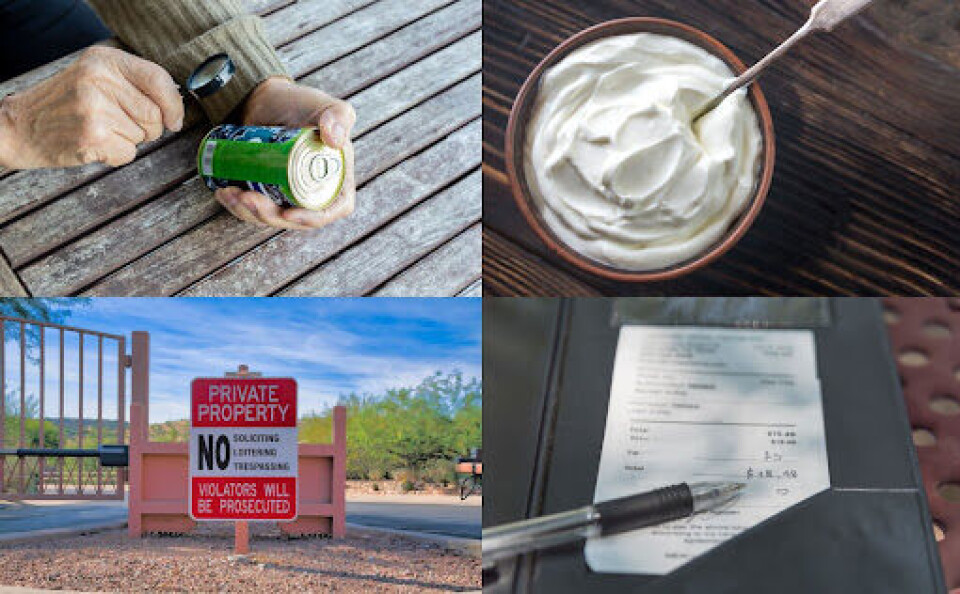-
Hungry, peckish, stuffed: 11 French phrases to do with food and eating
These phrases help to talk about one of the most important subjects in France - food
-
Can you guess the meaning of grincheux?
Read about a real-life example illustrating when to use this fun French adjective
-
When and why do we say c’est la goutte d'eau qui fait déborder le vase?
An expression to indicate that something has tipped you over the edge
Five language ‘faux-amis’ that confused me as a French person in US
Living in the United States led to various perplexing moments including asking for crème fraîche and being shown beauty creams, recalls Théophile Larcher

One of the various disadvantages of mastering another language lies in the handling of ‘faux-amis’ between the two tongues; and French and English have a number of words that sound very similar or identical, but in fact have different meanings.
Wikipedia even has a French page dedicated to several hundreds of similar words between French and American or British English, with different translations.
I experienced this myself when I lived in the United States from 2018 to 2019, as part of a study abroad programme. It was my first long-term experience abroad.
Here are five faux-amis that I remember or find funniest to translate.
Bigot
Bigot was one of the many words that I came to read or hear a lot within the American media landscape at a time when the division the country felt under Donald Trump’s presidency was at its height, amid cross-party Democrat and Republican verbal attacks.
It remains a bit of a hurdle for my French brain to dissociate it from the French word bigot.
The English term is typically a pejorative way to describe someone being intolerant, while the French word almost always refers to someone extremely religious.
Soliciting
Soliciting is easier to understand when in public places, like on road signs as the environment gives the clue that it cannot be the same meaning as the French word - but it can be more challenging if only read in a book or a text.
I learned about ‘soliciting’ through American signs in car parks and understood automatically that it refers to - mostly - prostitution, which we would call racolage or asking for money / panhandling, faire la manche, in French.
Solliciter in French - with two Ls - means to ask someone for something, often help. It can also mean more metaphorically to hold someone’s attention, and has nothing to do with prostitution…
Gratuity
Gratuity is another faux-ami for French people that can potentially lead to awkward situations, most often in restaurants or companies in the catering or service industry.
French people may confuse the mention of ‘gratuity 15%’ on a receipt, and think that it means a discount of 15% off the price. This is because gratuity is very similar to gratuité, a French word that means that something is free.
In fact, ‘gratuity’ in US English tends to refer to the ‘service charge’ or tip paid to the serving staff and not to anything ‘free’.
Preservatives
Very funny when grocery shopping and holding a can of Bush’s canned beans while reading the list of ingredients.
Preservatives translates to conservateurs in French, which makes sense because it derives from preserve, a verb that translates equally in French (préserver).
A French person cannot, however, escape the urge to think about préservatifs (condoms).
Crème fraîche
The biggest hurdle for a French foodie like me was to find proper crème fraîche.
It took me three trips to stores including Albertsons, Target and Sprouts Farmers Market, Before I gave up on finding it.
When I first asked for crème fraîche, I was first directed toward ‘Fresh cream’, which turned out to be beauty creams from the brand Fresh. On my second try, I was shown ‘fresh cream’ which is a sort of heavy whipped cream.
When I came back home and told my housemates I still had not found what I was looking for, one of them said: “Oh, crème fraîche!”
I thought it would be the end of my research, hoping I would finally find some.
This ‘creme fraiche’ however was actually a sort of Philadelphia cream cheese. I met a French woman two months later when shopping for food, and asked her about it. She told me to give up on finding the elusive dairy item.
The impossibility of finding the product may be linked to the fact it is only partially pasteurised, and that there are strict laws on how products are pasteurised in the United States.
Charity / food bank
As part of my journalism training in the US, one of our exercises saw us attend a press conference about a charity that worked to help students who could not afford food. It provided items through a school food bank.
My French brain did not understand the word ‘charity’ at first considering it could reasonably not be translated into charité (the idea of ‘being charitable’ in English).
It took me several minutes to understand that the correct translation for the noun ‘a charity’ would be ‘association’. I still sometimes say association in English when meaning charity.
























